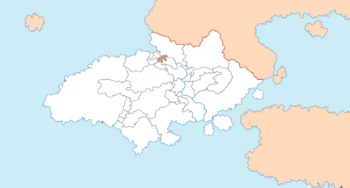Landgraviate of Tale-Flußstadt and Ersau
Landgraviate of Tale-Flußstadt and Ersau Landgrafschaft Talen-Flußstadt und Ersau (Alemannisch) | |
|---|---|
| 1497 | |
|
Flag | |
 | |
| Status | State |
| Capital | Flußstadt |
| Common languages | Alemannisch |
| Demonym(s) | Taler, Flußstadter, Ersauer |
| Government | Landgraviate |
| Georg Dietrich VI | |
| History | |
• Dissolution of the Duchy of Großtal | 1267 |
• Flußstadt Partition | 1497 |
• Inheritance of Ersau | 1655 |
Tale-Flußstadt and Ersau, officially the Landgraviate of Tale-Flußstadt and Ersau (Alemannisch: Landgraviate of Tale-Flußstadt and Ersau), sometimes just called Tale-Flußstadt, is a semi-independent constituent state of Dolchland. Tale-Flußstadt and Ersau is located in the Drei Flüsse region of Dolchland. It is bordered by Bessen-Katzenelm to the north, Tale-Schüssel to the east, Tale-Beiberg to the south and Upper Streckeburg and Kirchmarkt and Teilen to the west.
Tale-Flußstadt and Ersau arose from the prior Duchy of Großtal, which had itself emerged from the far smaller County of Thal, which had ruled from the castle of Adlerburg. Over many years, Großtal had grown to control all the Drei Flüsse region and further, and its ruling house, the House of Jostin, had become one of the most influential houses in imperial politics. This came to a head in 1265, when ($DUKE) rebelled against ($KING) in ($WAR). With the unforeseen counter-rebellion of a number of Großtal's subjects, including the County of Streckeburg and forces loyal to the Diocese of Kirchmarkt, ($DUKE) was defeated by the loyalist forces, and in 1267, the Principality of Streckeburg, the Bishopric of Kirchmarkt and the Landgraviate of Tale-Beiberg were partitioned away, leaving a rump state, the Duchy of Tal, controlling around half of its previous territory. After another partition due to inheritance in 1497, Tale-Flußstadt was birthed from the rump duchy, becoming a short-lived county, before being granted the status of landgrave. 1655 saw the inheritance of the County of Ersau into the state, which saw the official name of the Landgraviate become Tale-Flußstadt and Ersau, which is how Landgraves of the state have ruled ever since.
